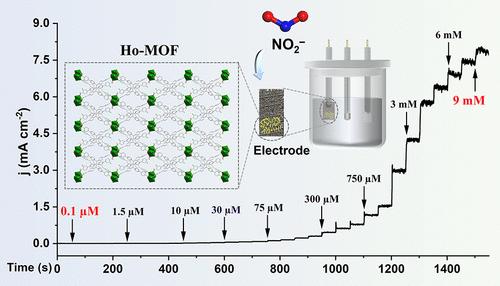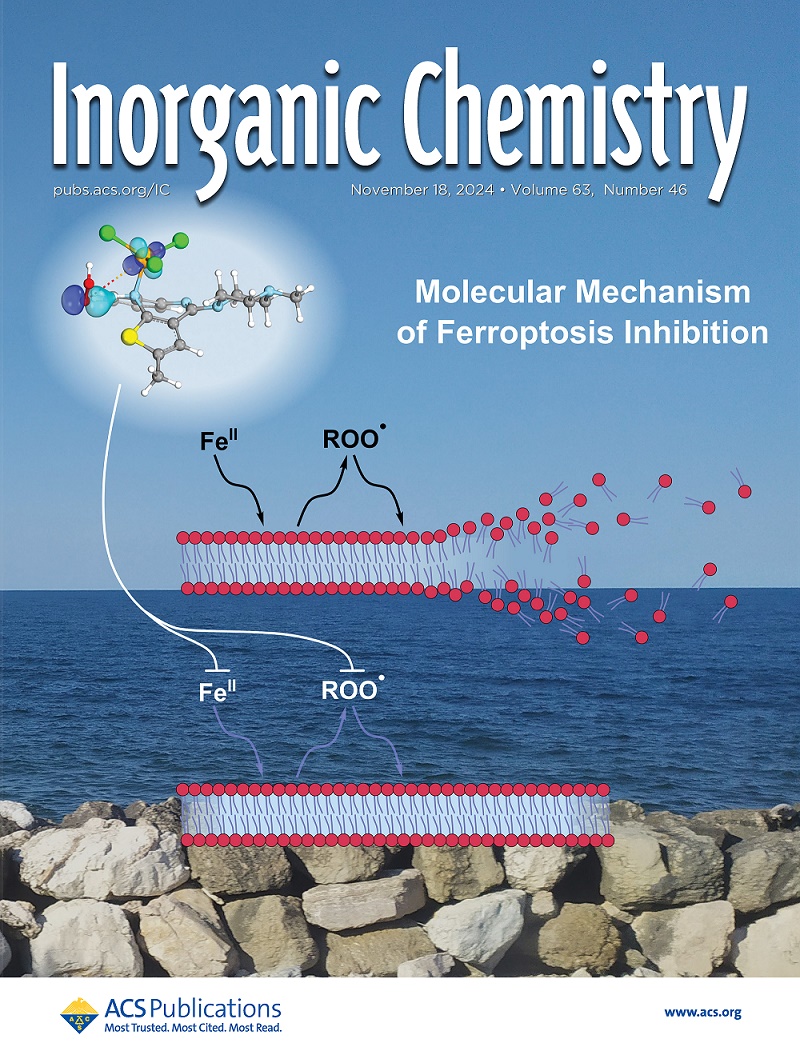An Acid-Resistant Lanthanide Metal–Organic Framework Based on Tetraphenylethylene as an Electrochemical Nitrite Sensor
IF 4.3
2区 化学
Q1 CHEMISTRY, INORGANIC & NUCLEAR
引用次数: 0
Abstract
Nitrite (NO2–) is attracting increasing attention due to its harmful effect on human health. Thus, it is highly desirable to construct effective electrochemical sensors to detect the presence of NO2–. The majority of electrochemical NO2– detection is focused on alkaline or neutral electrolyte solutions and is rarely reported under acidic conditions. In this work, a tetraphenylethylene (TPE)-based 2D lanthanide metal–organic framework (Ln-MOF), (Me2NH2)[HoIII(tcbpe-F)DMF]•DMF•H2O (1) (tcbpe-F = 4′,4‴,4″‴,4″″‴-(ethene-1,1,2,2-tetrayl)tetrakis(3-fluoro-[1,1′-biphenyl]-4-carboxylic acid, DMF = N,N-dimethylformamide)), has been successfully fabricated on carbon paper (CP) by an in situ hydrothermal method. As a NO2– sensor, the fabricated 1 electrode exhibited excellent electrochemical performance in the H2SO4 electrolyte (pH = 1) and offers high sensitivities of 1453.2 and 591.5 μA mM–1 cm–2, with a wide linear detection range of 0.1 μM to 9 M, a low detection limit of 60 nM, excellent specificity even in the presence of various analytes (metal ions, anions, and organic molecules) and real water samples, satisfactory stability, and reproducibility. This is the first report of TPE-based Ln-MOF as a NO2– sensor, and furthermore, a plausible sensing mechanism is confirmed by experiments and theoretical computations.

基于四苯基乙烯的耐酸镧系金属有机框架作为电化学亚硝酸盐传感器
亚硝酸盐(NO2-)因其对人类健康的有害影响而日益受到关注。因此,构建有效的电化学传感器来检测 NO2- 的存在是非常有必要的。大多数电化学 NO2- 检测都集中在碱性或中性电解质溶液中,很少有在酸性条件下检测 NO2- 的报道。在这项工作中,一种基于四苯基乙烯 (TPE) 的二维镧系金属有机框架 (Ln-MOF),(Me2NH2)[HoIII(tcbpe-F)DMF]-DMF-H2O (1) (tcbpe-F = 4′,4‴,4″‴,4″‴-(乙烯-1、1,2,2-四基)四(3-氟-[1,1′-联苯]-4-羧酸,DMF = N,N-二甲基甲酰胺)),通过原位水热法在碳纸(CP)上成功制成。作为一种 NO2- 传感器,所制备的 1 号电极在 H2SO4 电解质(pH = 1)中表现出优异的电化学性能,灵敏度高达 1453.2 和 591.5 μA mM-1 cm-2,线性检测范围宽至 0.1 μM 至 9 M,检测限低至 60 nM,即使在存在各种分析物(金属离子、阴离子和有机分子)和真实水样的情况下也具有极佳的特异性,稳定性和重现性令人满意。这是首次报道基于 TPE 的 Ln-MOF 作为二氧化氮传感器,而且实验和理论计算证实了其合理的传感机制。
本文章由计算机程序翻译,如有差异,请以英文原文为准。
求助全文
约1分钟内获得全文
求助全文
来源期刊

Inorganic Chemistry
化学-无机化学与核化学
CiteScore
7.60
自引率
13.00%
发文量
1960
审稿时长
1.9 months
期刊介绍:
Inorganic Chemistry publishes fundamental studies in all phases of inorganic chemistry. Coverage includes experimental and theoretical reports on quantitative studies of structure and thermodynamics, kinetics, mechanisms of inorganic reactions, bioinorganic chemistry, and relevant aspects of organometallic chemistry, solid-state phenomena, and chemical bonding theory. Emphasis is placed on the synthesis, structure, thermodynamics, reactivity, spectroscopy, and bonding properties of significant new and known compounds.
 求助内容:
求助内容: 应助结果提醒方式:
应助结果提醒方式:


